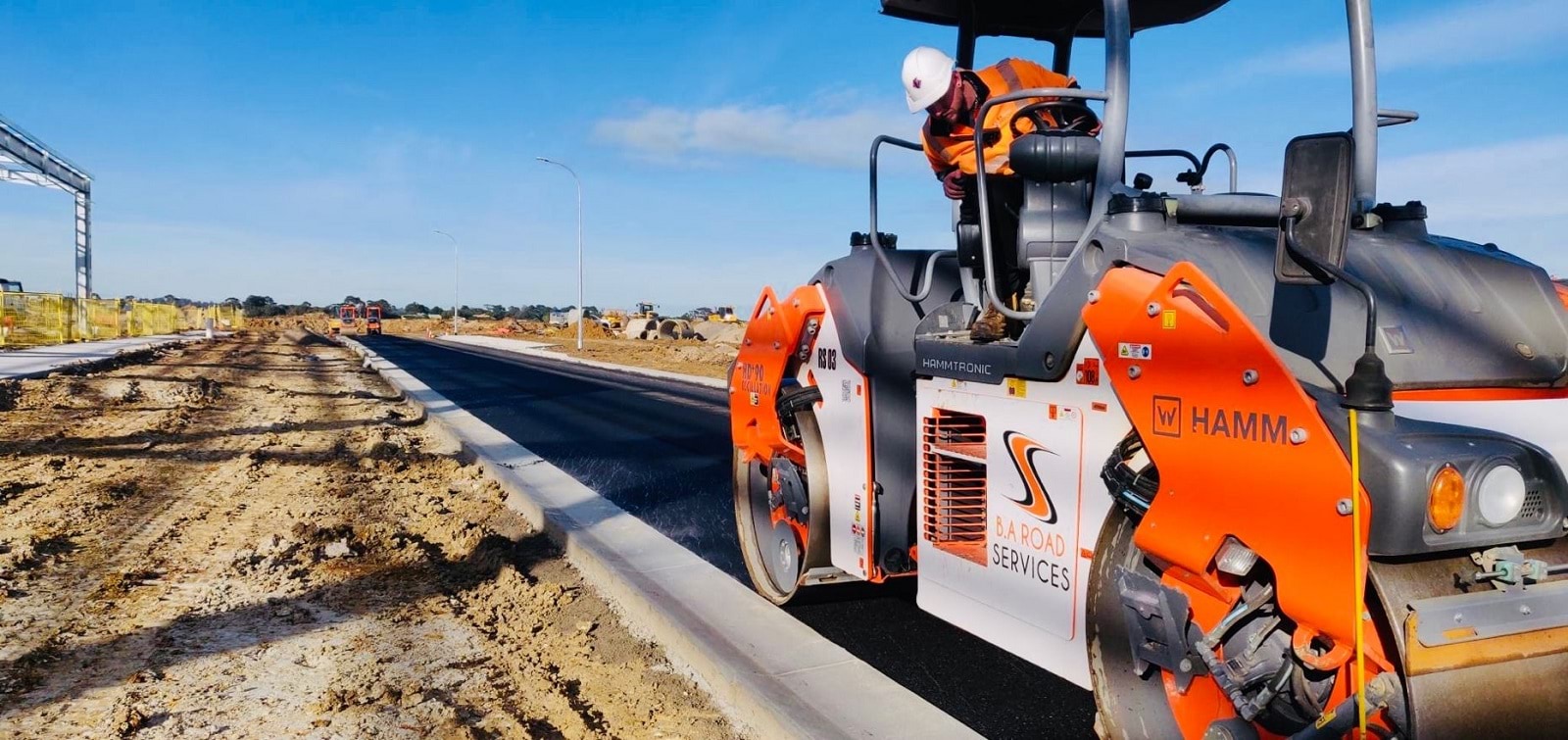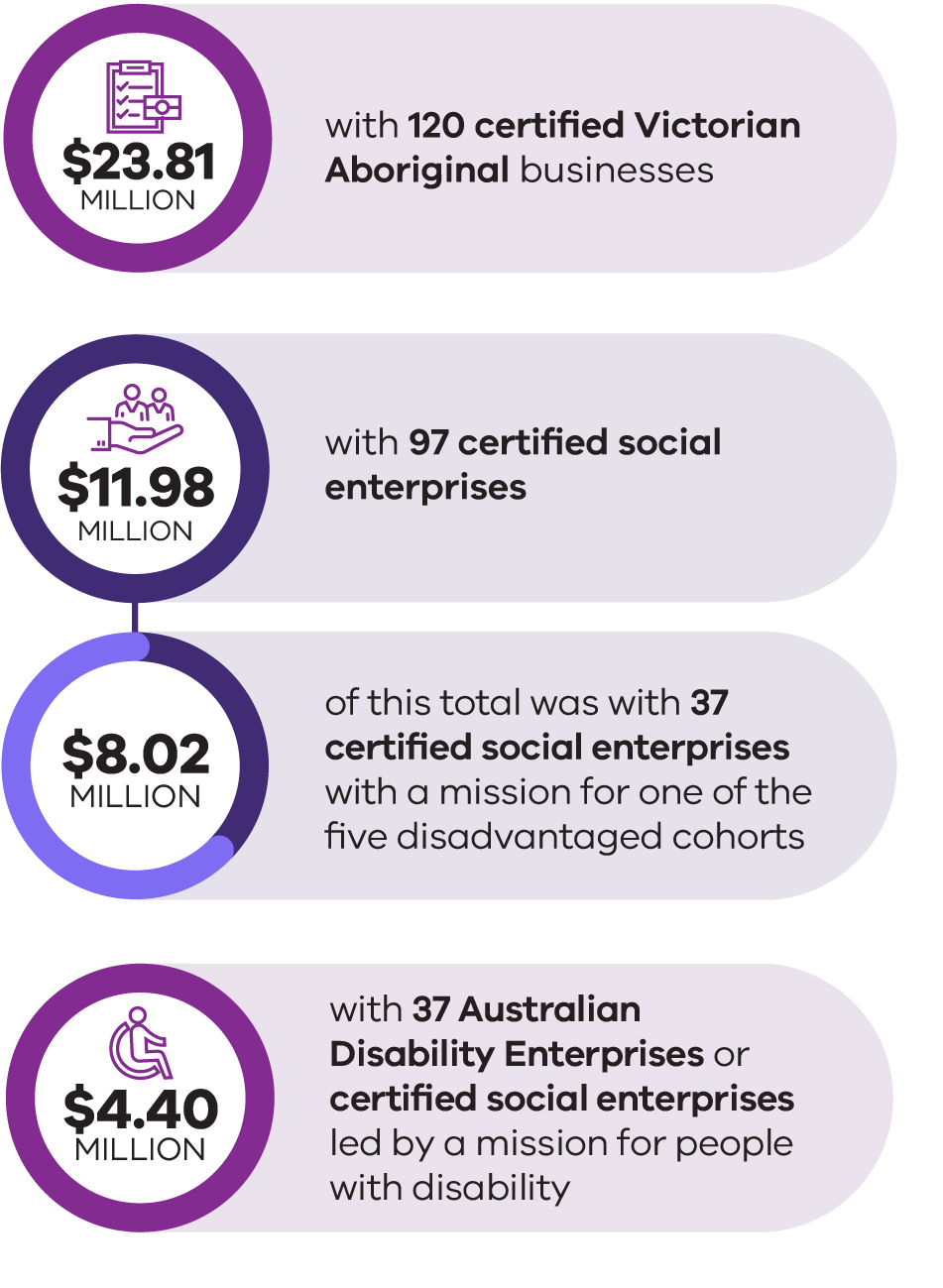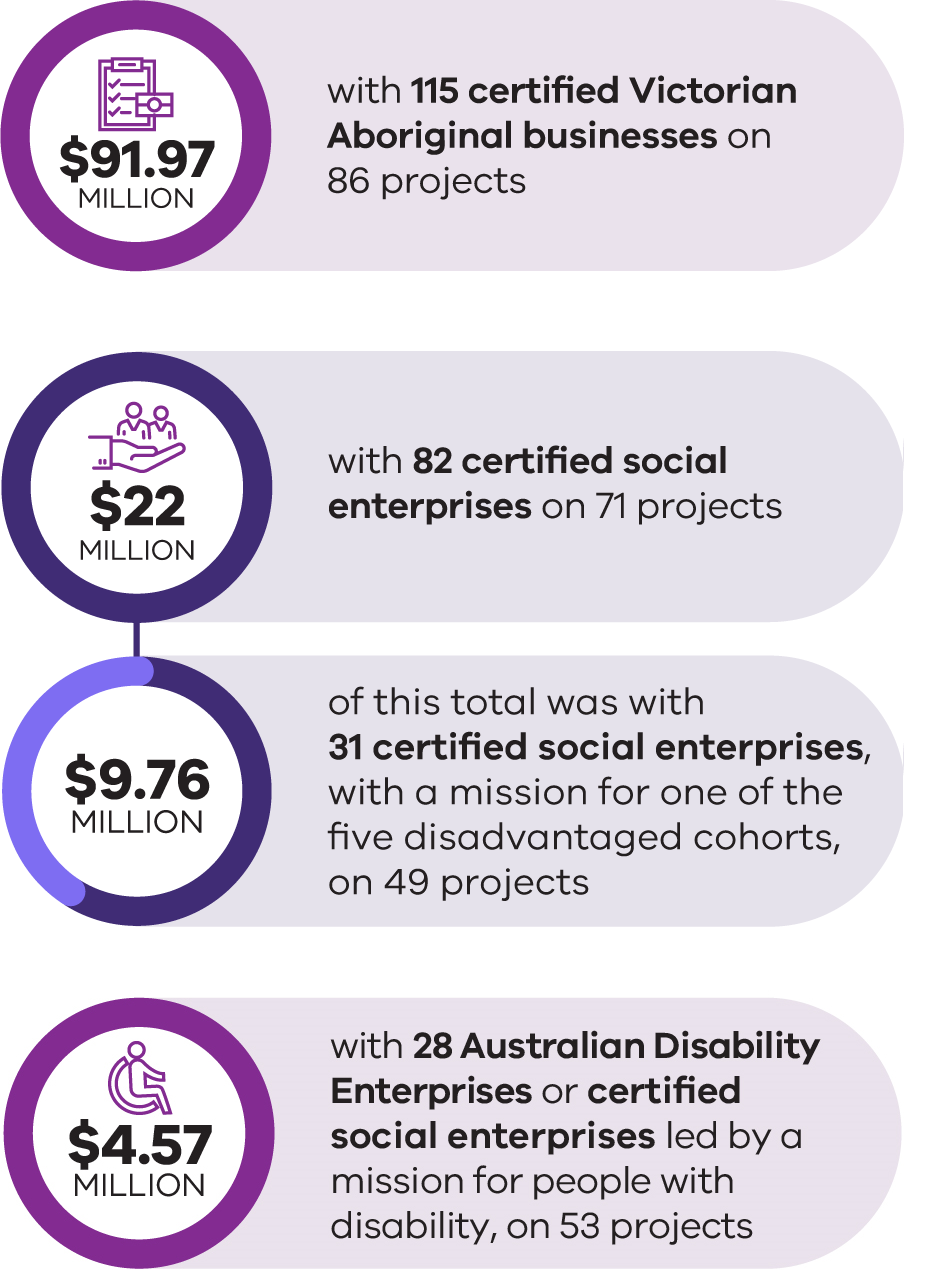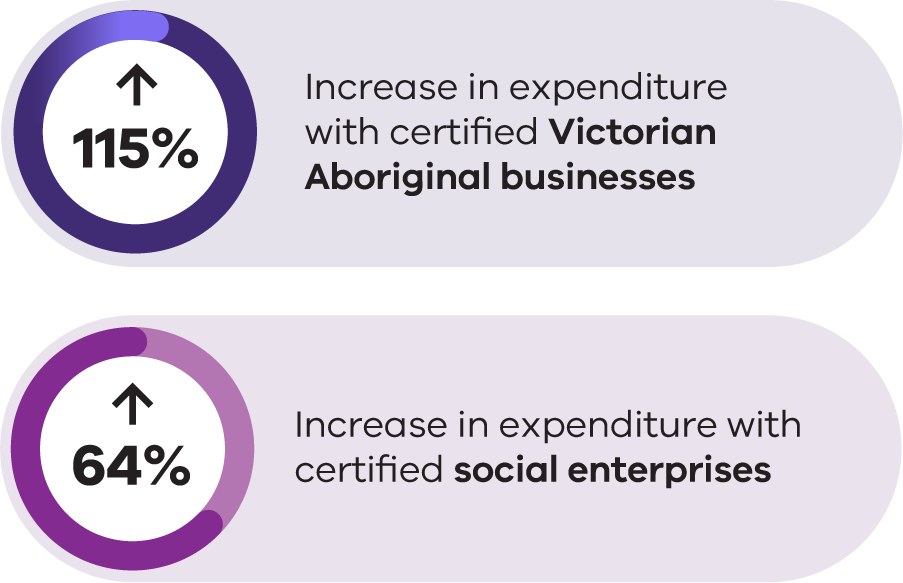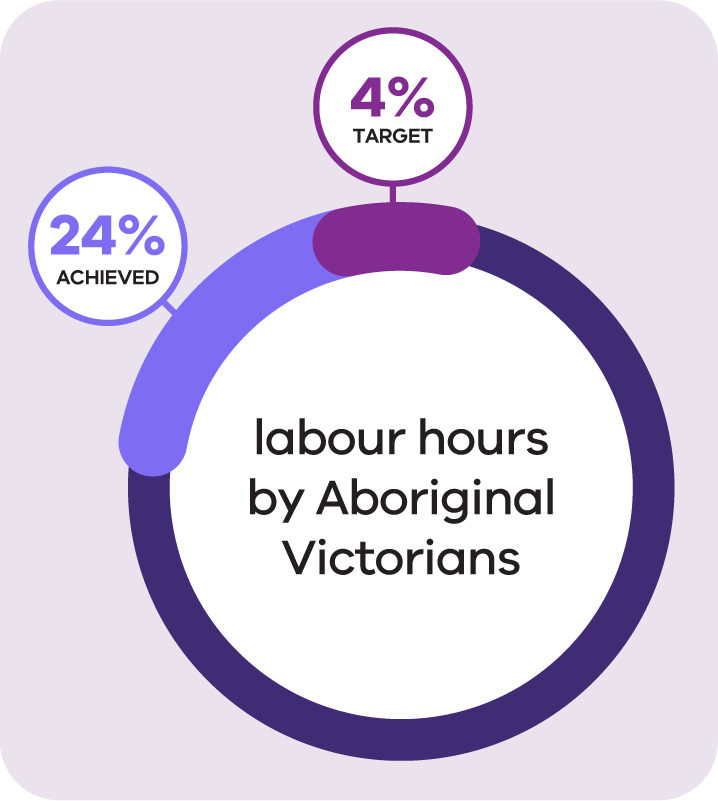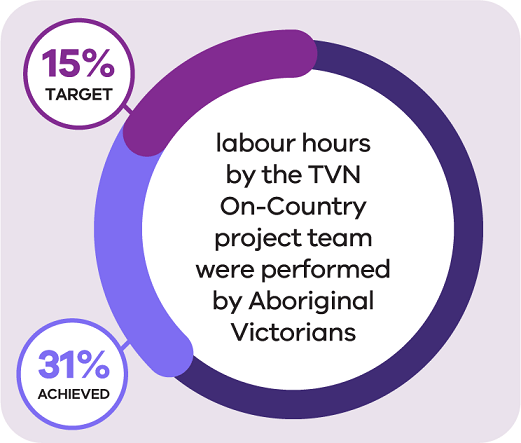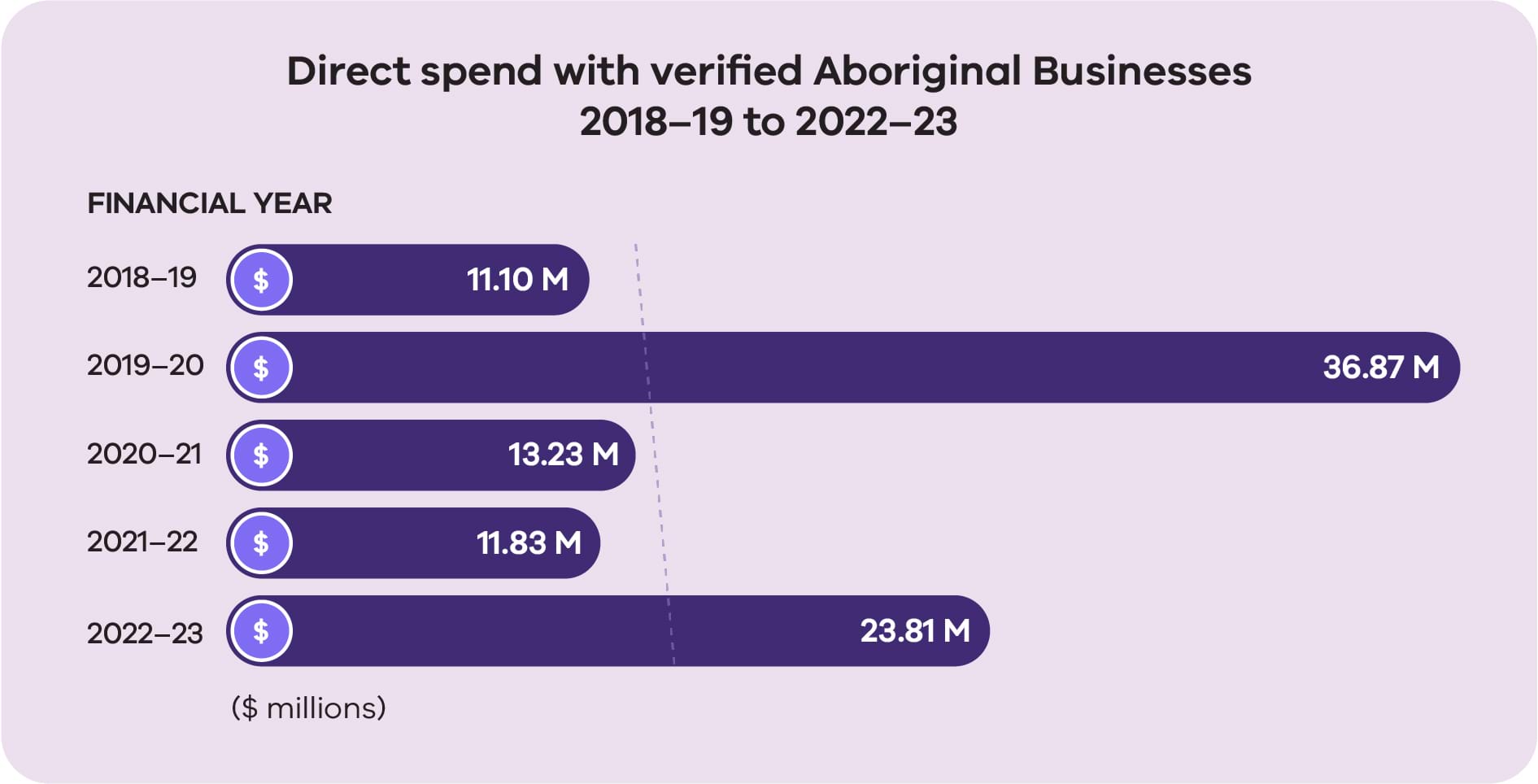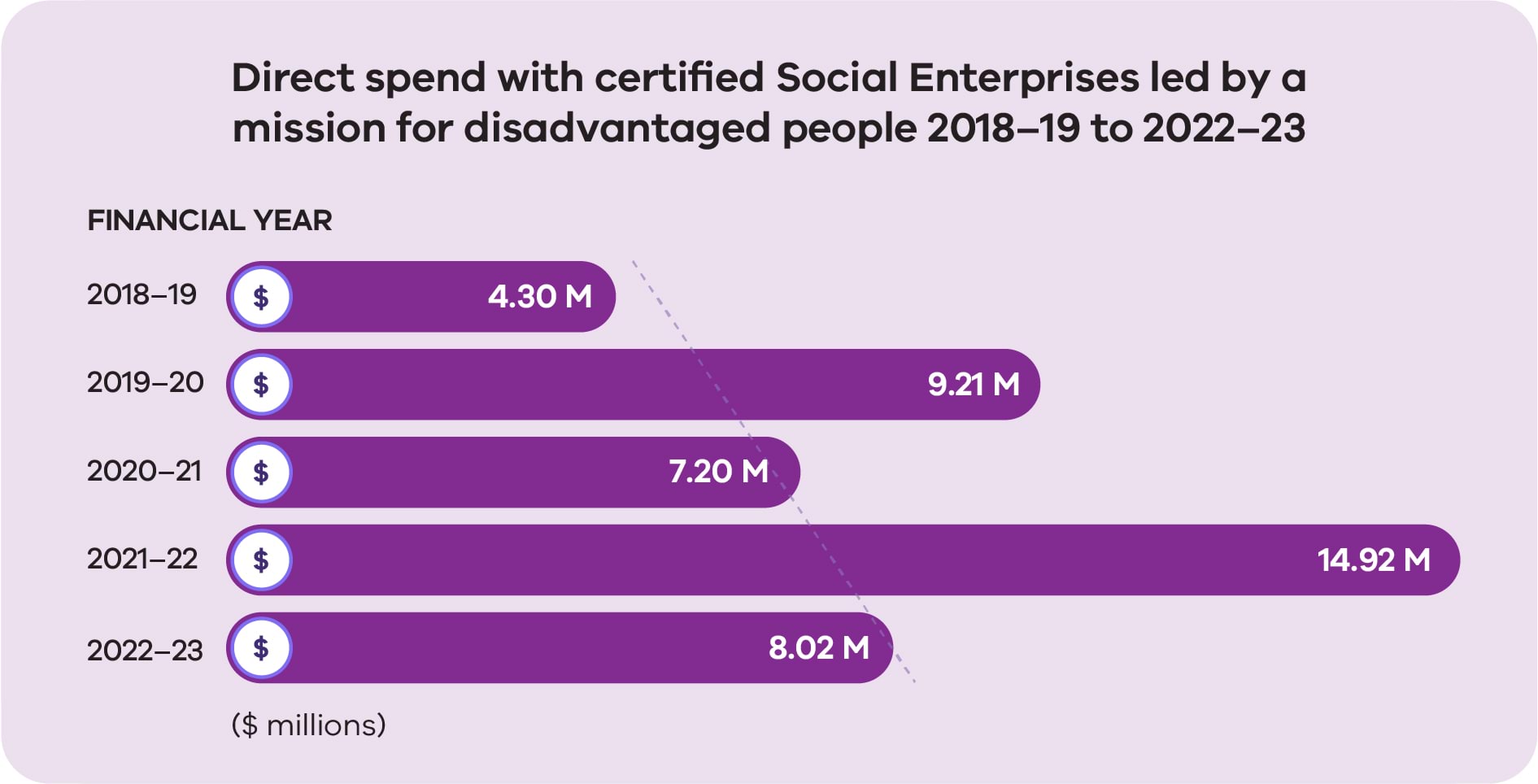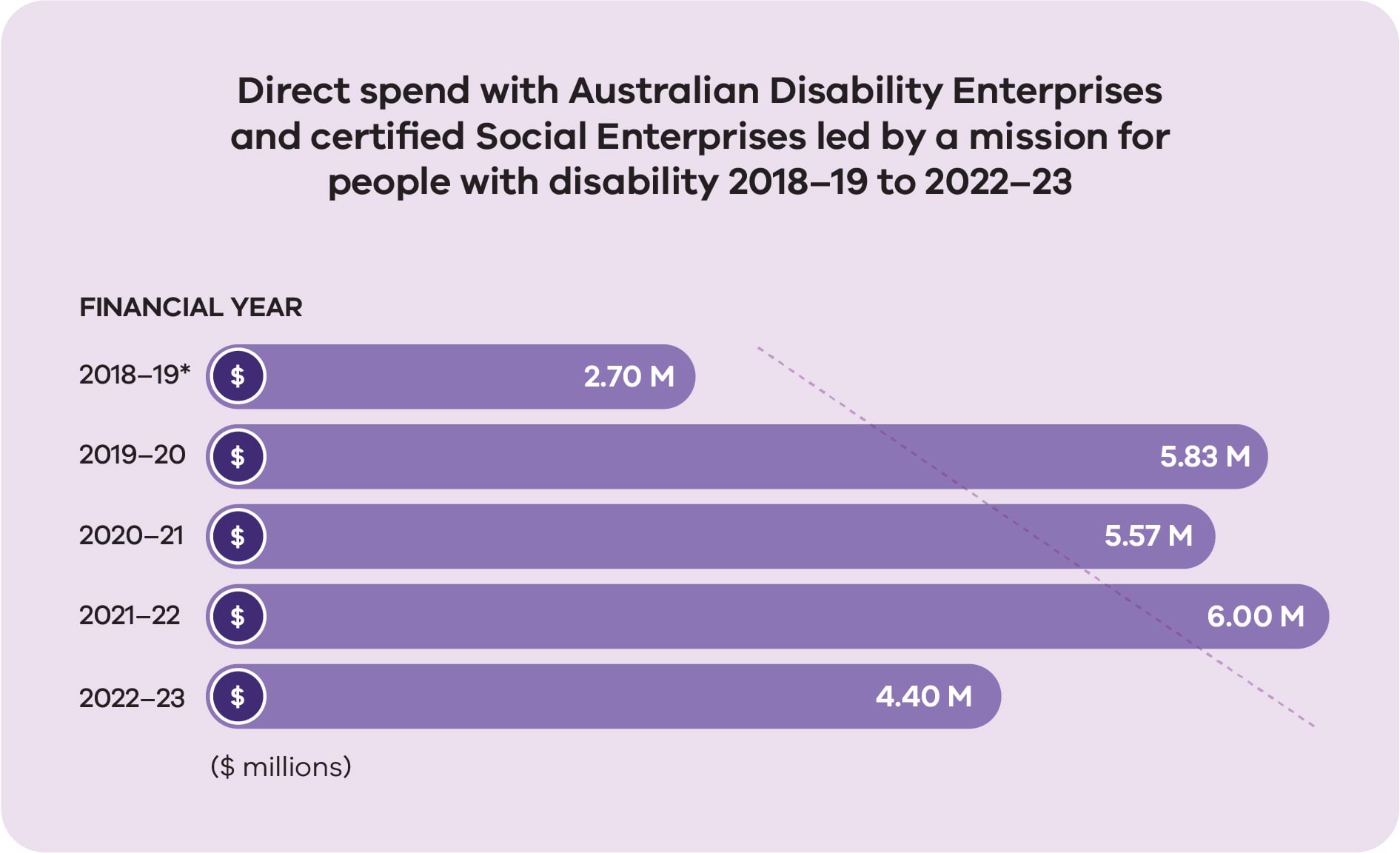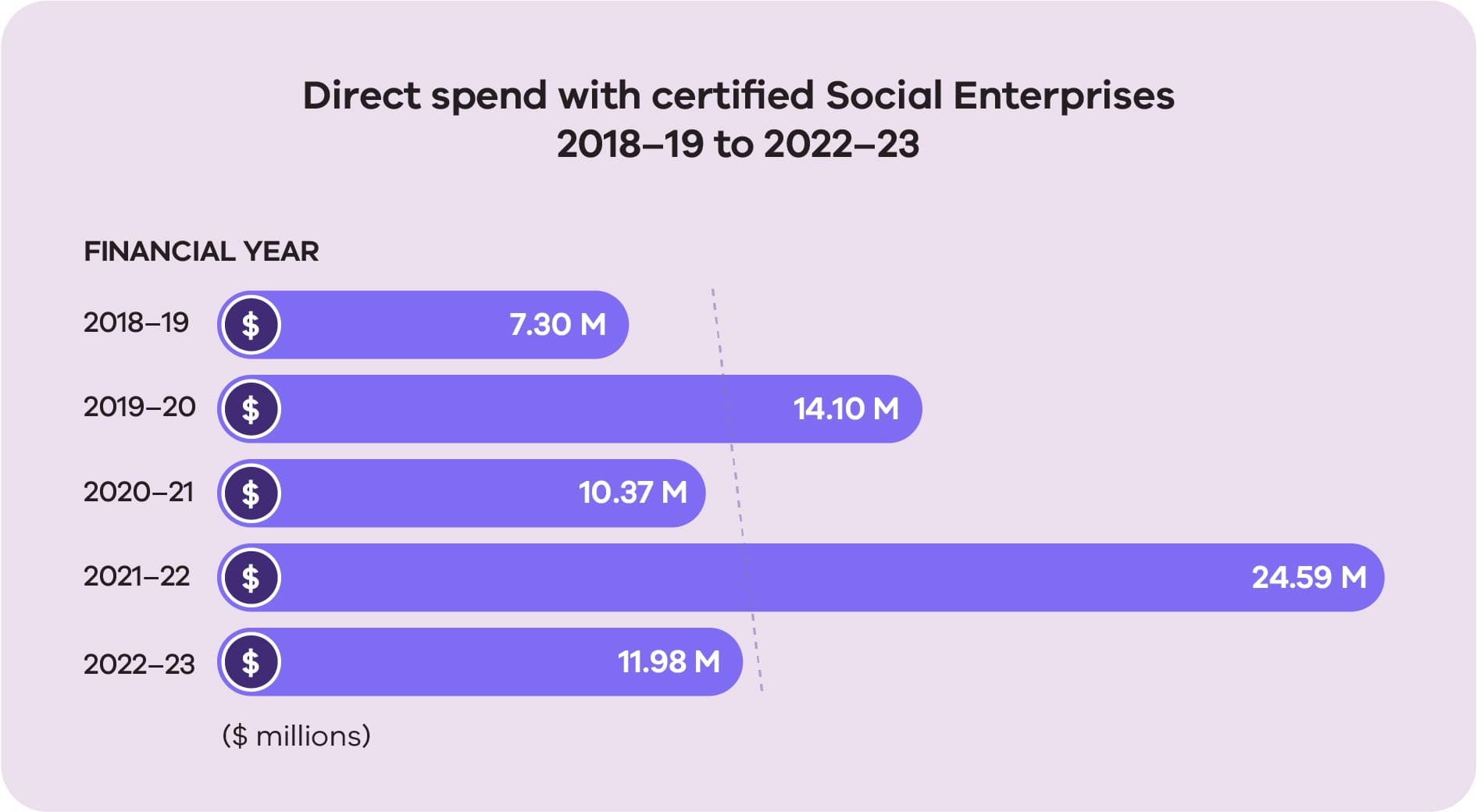- Published by:
- Department of Government Services
- Date:
- 26 Apr 2024
The report provides a snapshot of Social Procurement Framework achievements over time and stories that showcase the impacts of the Framework on Victorians and social benefit suppliers.
The report also demonstrates the difference each government procurement can make to the lives of Victorians and Victorian communities.
It also sets a baseline to measure social procurement achievements in the future.
Acknowledgments
Victoria’s Social Procurement Framework was developed by the Department of Government Services. A range of departments and agencies across government contribute to the Social Procurement Framework annual report each year. From 1 January 2023, all functions relating to the Social Procurement Framework were coordinated by the newly formed Department of Government Services. Gabrielle Williams is the responsible Minister for the framework in her capacity as the Minister for Government Services.
The infographics and images in this report were designed by Little Rocket. The engagement of Little Rocket is an example of the Victorian Government’s Social Procurement Framework in action, directly contributing to the outcomes sought under the following 2 objectives:
- Opportunities for Victorian Aboriginal people
- Sustainable Victorian social enterprise and Aboriginal business sectors
Language statement
We recognise the diversity of Aboriginal people living in Victoria. We use the term ‘Aboriginal Victorians’ to include Victorian Traditional Owners, clans, family groups, and all other Aboriginal and Torres Strait Islander descendants living in Victoria. The term ‘Aboriginal community’ includes Traditional Owners, business owners and other community representatives.
Disclaimer
This publication may be of assistance to you, but the State of Victoria and its employees do not guarantee that the publication is without flaw of any kind or is wholly appropriate for your particular purposes and therefore disclaims all liability for any error, loss or other consequence which may arise from you relying on any information in this publication.
Accessibility
We have provided as much of this annual report in HTML as practicable. Complex data tables are provided in position in Word documents. Diagrams with spatial information are presented in position as text.
If you would like to receive this publication in an accessible format, please telephone 03 7005 9138 or email: buyingforvictoria@dtf.vic.gov.au.
Introducing the Social Procurement Framework Annual Report 2022-23
Message from Gabrielle Williams, Minister for Government Services.

Gabrielle Williams, Minister for Government Services
Government procurement is one of the largest drivers in our state’s economy. Through innovative social procurement policy, government procurement decisions have the power to drive sustainable growth for all Victorians.
The Social Procurement Framework (the Framework) ensures that value-for-money considerations that underpin all Victorian Government procurement decisions encompass opportunities to deliver sustainable social, environmental and economic outcomes that benefit our communities.
During the 2022–23 financial year, the Victorian government spent $27.3 billion on goods and services and $21.8 billion on public construction and infrastructure1. With careful planning in line with the Framework, we used this spending strategically to create employment opportunities for priority groups and make it easier for Victorian Aboriginal businesses, social enterprises and Australian Disability Enterprises to do business with government.
From 1 January 2023, the social procurement policy implementation and assurance functions were brought together under the Minister for Government Services at the newly created Department of Government Services (DGS). This consolidation improves coordination and delivers efficiency dividends among these different services.
In 2022–23, DGS focused on supporting government buyers in engaging with Victoria’s vibrant social enterprise sector and growing the Aboriginal business sector to strengthen Aboriginal Victorians’ self-determination.
DGS also improved social procurement data collection and digital tools to demonstrate the value of social procurement and help government hone in on areas where we can deliver valuable social, environmental and economic outcomes.
The Framework continues to be an important policy lever to generate social value above and beyond the value of the goods, services or construction being procured. With it, we can ensure that Victorians, regardless of gender, background or ability, share in our state’s prosperity. I am proud to share some of their stories in this report with you.
1: Figures were extracted from the 2022-23 Financial Report. The Victorian government goods and services spend figure used in this report was calculated by deducting finance expenses and fees, and insurance claim expenses from ‘Other operating expenses’.
About the Framework in 2022-23
Value for money is a key consideration underpinning all Victorian Government procurement decisions.
Victorian Government procurement is one of the largest drivers of the Victorian economy. Value for money is the key consideration underpinning all Victorian Government procurement decisions. The Social Procurement Framework (the Framework) ensures value-for-money considerations are not solely focused on price but encompass opportunities to deliver social and sustainable outcomes that benefit the entire Victorian community. In this way, the Framework helps government create economic benefit and jobs for all Victorians.
Objectives and outcomes
The Framework has 10 objectives, each with specific and measurable outcomes.
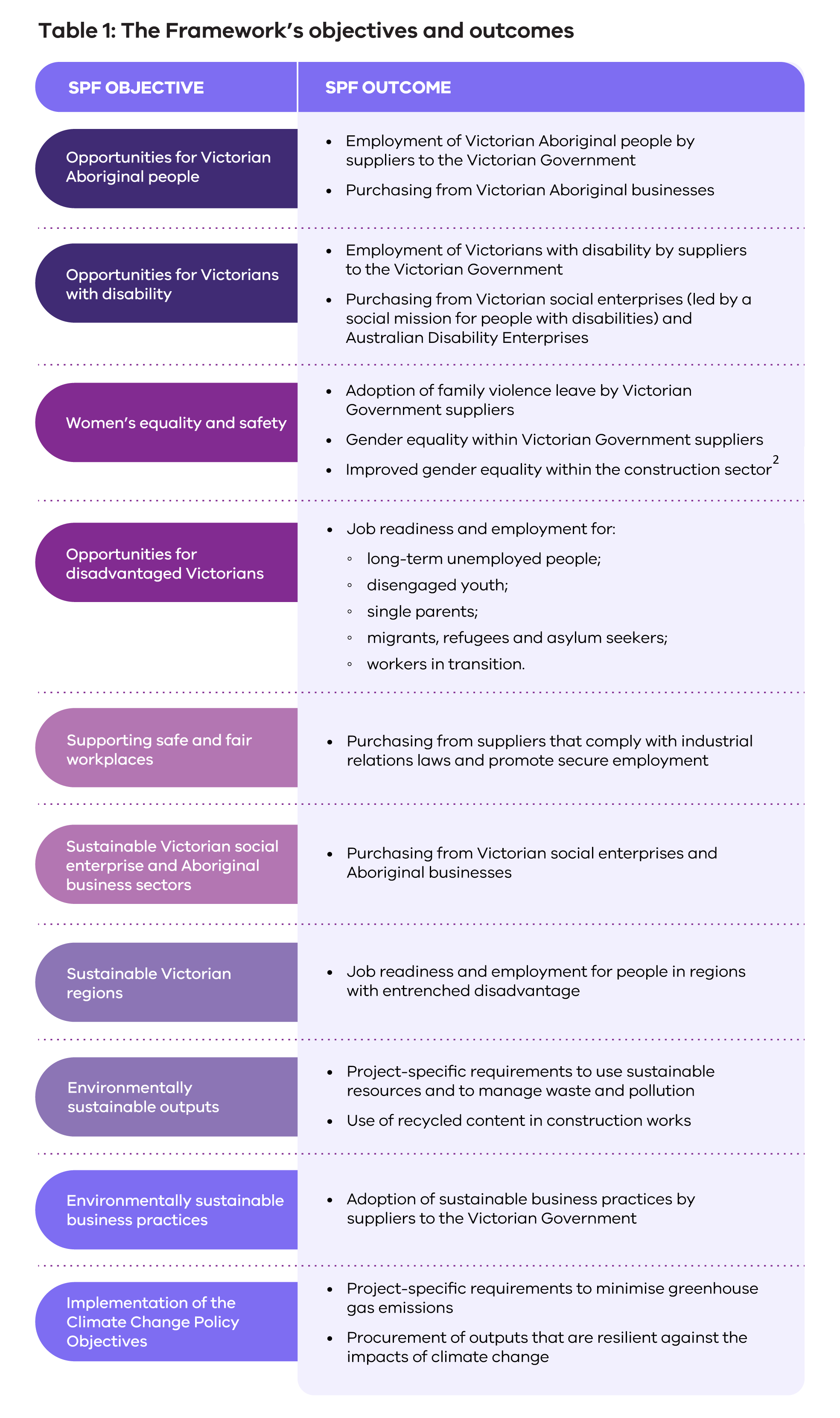
Social procurement objectives and summary of priorities
The Framework is used by more than 260 government departments and agencies3 to identify their social and sustainable procurement goals. These goals are detailed in the agency’s Social Procurement Strategy or Plan and will often align with other government strategies, priorities and initiatives. Departments and agencies report on progress towards their social and sustainable procurement goals in their respective annual reports and contribute to the whole-of-government report. The priority objectives of departments and core agencies in 2022-23 are depicted in Table 24
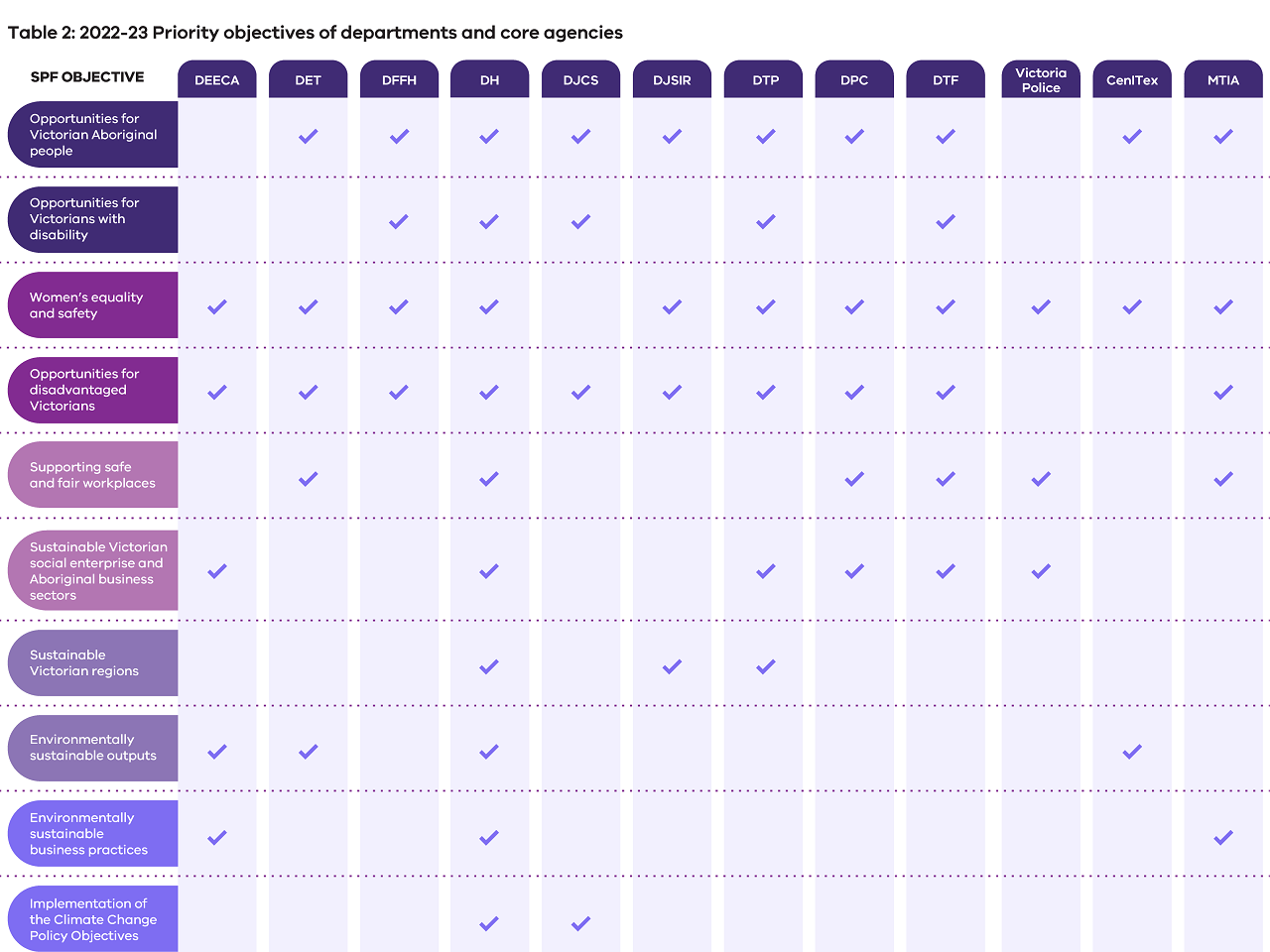
2: For all publicly funded construction projects valued at $20 million or more, the Building Equality Policy replaces this objective.
3: This refers to government departments and agencies subject to the Standing Directions 2018 under the Financial Management Act 1994 as at January 2023.
4: On 1 January 2023, a number of Machinery of Government changes were instituted. The agencies and departments listed here were effective as of 30 June 2023. The same changes also created DGS. As of 30 June 2023, DGS was still establishing its central procurement processes including its social procurement strategy. DGS has therefore been excluded from this table. For further information, see: https://vpsc.vic.gov.au/about-public-sector/machinery-of-government/
Partners in 2022-23
Social procurement is made possible through the support of a strong network for government buyers and suppliers.
Social procurement is made possible through the support of a strong network for government buyers and suppliers. In 2022–23, the central teams supporting the Framework had agreements with the following support partners:
Kinaway
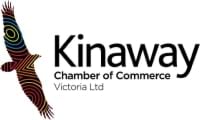
Kinaway Chamber of Commerce provides business support and advice to Victorian Aboriginal businesspeople and helps improve the visibility and networks of Aboriginal businesses to strengthen relationships and create opportunities.
Kinaway publishes a list of certified Victorian Aboriginal businesses and provides departments and Victoria Police with support services to identify opportunities to increase engagement with Victorian Aboriginal businesses. Kinaway advises that the number of certified businesses listed on its directory increased from 440 to 511 businesses in 2022–23, an increase of 71 members.
Social Traders

Social Traders certifies, strengthens and connects social enterprises with business and government members. By activating the power of social enterprise procurement, Social Traders creates positive impact through jobs, community services and support for the most marginalised. All Victorian Government buyers have access to the Social Traders Portal which includes a list of social enterprises, and some departments and agencies support their internal social procurement capability through a membership with Social Traders.
Social Traders advises that there were 509 active certified social enterprises as of 30 June 2023, with almost half of these businesses headquartered in Victoria. The Social Traders Impact Report FY22 reports on achievements generated by spend with certified social enterprises.
ICN

Industry Capability Network (ICN) is a network of independent experienced industry procurement and supply chain specialists introducing large and small businesses to projects across Australia and New Zealand. ICN is continuing to develop system capability to capture and report on the Framework commitments and achievements through the ICN Victorian Management Centre platform.
Strengthening social outcomes in 2022-23
Working with buyers to ensure appropriate social and sustainable commitments are implemented in procurements.
The DGS Social Procurement and Assurance team supports the effective delivery of the Framework across the Victorian Government and its supply chain, by working with project teams across government to ensure appropriate social and sustainable targets are implemented in high-value procurements. The number of Victorian Government projects valued at $20 million or more that were engaged by the team during the procurement process almost doubled from 53 in FY2021–22 to 98 in FY2022–23.
Collaborating with the project teams at the early stages of the procurement to identify opportunities optimises the outcomes that can be achieved. For example, the team recently collaborated with a government agency when procuring the construction of fit for purposes buildings which resulted in an additional economic value5 of $5.2 million for the Victorian community committed in the contract. This comprised spend with social benefit suppliers and employment of priority jobseekers.
During the 2022–23 financial year, there were several changes in the social procurement context which influenced the way the Framework is being implemented. These changes reflect a growing maturity across business and government in generating social and sustainable outcomes through procurement and more broadly.
Changing policy context
From 1 December 2022, all Victorian Government agencies are required to apply the Fair Jobs Code (the Code) to all tenders of $3 million or more. The Code enables the Government to use its purchasing power to promote secure employment and fair labour standards as well as ensure compliance with employment, workplace and industrial laws. The Code now captures the requirements under the Framework’s Opportunities for Safe and Fair Workplaces objective.
More information is available on the Fair Jobs Code section of the Buying for Victoria website.
The Federal Government amended the Fair Work Act 2009 so that from 1 February 2023 all employees are entitled to 10 days of paid family and domestic violence leave each year. This includes full-time, part-time and casual employees. The change means that all tenderers should already provide family and domestic violence leave for their employees. This change by the Federal Government addresses the family violence leave outcome from the Women’s Equality and Safety objective.
A review of how these new policies affect the Framework is underway to consider if any consequential updates to the Framework are required.
Continuous improvement of policy implementation
To keep pace with the evolving and maturing social benefit supplier sector, the Social Procurement and Assurance team refined the reporting criteria for identifying in-scope social benefit suppliers for social procurement expenditure reporting. This enhancement targets social benefit suppliers certified as of 30 June 2023 for inclusion in reporting. It also provides greater assurance to Victorian Government buyers and suppliers that expenditure with these suppliers is creating genuine impact.
5: Additional value when compared to a similar project where the Assurance team was not involved. The value of employment for priority jobseekers has been calculated using the Australian Social Value Bank.
Achievements in 2022-23
Achievements since the launch of the Framework in 2018 including the 2022-23 financial year.
Achievements since the launch of the Framework in 2018
Since 2018, Victorian Government departments and agencies6 have continued to directly invest in Victoria’s social benefit suppliers with expenditure of:
Achievements in this reporting period (1 July 2022–30 June 2023)
Victorian Government departments and agencies6 have directly spent:
Victorian Government departments and agencies indirectly spent9:
Suppliers to the Victorian Government employed10:
In FY2022-23 significant increases have been made in comparison to the benchmarks set in the inaugural 2018–19 annual report:
Case Study: The Victorian Government helps to create regional excellence in education and Aboriginal procurement
The Munarra Centre for Regional Excellence on Yorta Yorta Country in Shepparton will deliver culturally responsive education, employment, health and wellbeing programs to drive broad, long-term benefits for the region and Victoria. Thanks to social procurement, the construction of the centre has created jobs for Aboriginal people and work opportunities for Aboriginal businesses.
First Peoples State Relations and the Victorian School Building Authority (VSBA) have partnered with Munarra Limited to deliver the Munarra Centre for Regional Excellence, which was designed through a self-determined Aboriginal-led decision-making process. The campus will welcome Aboriginal and non-Aboriginal peoples of Australia and be home to the Munarra Academy. It will include programs from the University of Melbourne’s Academy of Sport Health and Education, which offers meaningful pathways to learning and work for students experiencing disadvantage, as well as the Goulburn Murray Indigenous Business Hub, the Kaiela Institute, the Rumbalara Aboriginal Football Netball Club, the Rumbalara Aboriginal Cooperative health services, and other partners.
The Munarra Centre is not only historic for what it is, but also for how it is being delivered. With over $36 million in funding to deliver the centre, the project represents one of the largest Victorian Government projects ever awarded directly to an Aboriginal-owned business based in Victoria.
The contract was awarded to TVN On-Country, a Kinaway certified 70% Aboriginal-owned commercial builder that is also passionate about helping Aboriginal youth gain ‘meaningful employment’.
“This is such an exciting project for us to be a part of given it aligned to our values. This is a landmark project that is going to improve the lives of First Nations people during construction and following handover, and most importantly, across future generations. This project has been the dream and vision of the community for many years, and we recognise and appreciate the trust that has been given to us and we can’t wait to bring the vision to reality for the community.”
The project has committed to ambitious social procurement targets and is on track to exceed them. The achievements between December 2022 and August 2023 include:
The project is also on-track to hit the target of 10% of total contract value spend with Aboriginal businesses (suppliers and subcontractors).
As a ground-breaking Aboriginal-led project, the Munarra Centre for Excellence highlights how social procurement can drive economic development and support Aboriginal-led initiatives and self-determination.
Construction on the centre commenced in February 2023, with the centre expected to open to the community in 2024.
Case Study: Social enterprise gains access to Victorian government business through State Purchase Contract
By combining demand for commonly used goods and services through the use of State Purchase Contracts (SPCs), government can harness greater economies of scale when negotiating with suppliers. Aggregating purchasing power allows organisations to negotiate better terms and conditions. It also reduces risk and the administrative burden on buyers and suppliers. Incorporating social benefit suppliers in SPCs improves social value created through government spending.
The mail and delivery services SPC was released to market this year with an aim to include a social benefit supplier. This is the first time a certified social enterprise has been appointed as one of only four suppliers on a whole-of-government SPC alongside national and multinational suppliers.
Local Transit is a Social Traders certified social enterprise which specialises in providing transport to people with disability, as well as providing regular courier services within metropolitan Melbourne. Local Transit focuses on providing employment to migrants and refugees experiencing disadvantage, especially those from East Africa. They aim to help migrants and refugees secure meaningful and sustainable work which will, in turn, help with community integration.
In 2022–23, Local Transit entered into their first contract with Melbourne Water through the state purchasing contract to provide a courier service. This first contract was valued at $20,000 for the year. Melbourne Water reports the social enterprise has been very supportive, actively coming up with ideas around extra services they might need and ways to deliver additional.
“Melbourne Water (MW) engaged Local Transit via the mail and delivery services SPC in November 2022. Ali, the founder, and delivery personnel are wonderful to deal with and ensured we had a seamless transition with the mail delivery service. We would highly recommend the service for their reliability and the social benefits achieved through this enterprise. MW embraced the opportunity to utilise a registered social enterprise via the SPC and encourages all SPC category managers to have a similar consideration and options.”
The procurement process featured some flexibility for certified social benefit suppliers as well as a reserved place on the panel. For example, social benefit suppliers had the opportunity to nominate their geographic coverage, rather than meeting the requirement to service the whole of Victoria. In the case of Local Transit, this was focused on transit and deliveries around Melbourne.
Local Transit hopes that this contract will be the first of many future engagements with the Victorian Government through the State Purchase Contract.
6: Departments and agencies included are Department of Energy, Environment and Climate Action (DEECA), Department of Education (DE), Department of Families, Fairness and Housing (DFFH), Department of Health (DH), Department of Justice and Community Safety (DJCS), Department of Jobs, Skills, Industry and Regions (DJSIR), Department of Transport and Planning (DTP), Department of Premier and Cabinet (DPC), Department of Treasury and Finance (DTF), Victoria Police, Major Transport Infrastructure Authority (MTIA) and CenITex.
7: Certified Aboriginal businesses refers to Victorian Aboriginal businesses that are certified by Kinaway or Supply Nation. For the 2022-23 reporting period, only spend with Victorian Aboriginal businesses certified by Kinaway or Supply Nation has been reported to ensure alignment with the Framework definitions.
8: Certified Victorian Social Enterprises refers to organisations that are certified by Social Traders and operate and have business premises in Victoria. There was a policy change to discontinue use of the Map for Impact database as a source to identify and verify social enterprises. The Map for Impact will no longer be included under the operational definition of ‘social enterprise’ for Framework purposes.
9: Only 2022-23 reporting period spend data associated with a social benefit supplier and approved by departments or agencies by August 2023 was extracted from the Victorian Management Centre (VMC) and included in this report. The Victorian Government departments and agencies that provided this data via the VMC includes: Community Safety Building Authority, Victorian Health Building Authority, Major Road Projects Authority, Melbourne Water Corporation, Southern Rural Water, Rail Projects Victoria, Greater Western Water, DTP, Level Crossing Removal Authority, West Gate Tunnel Project, North East Link Project, Parks Victoria, Court Services Victoria, Victorian School Building Authority, V/Line Pty Ltd, Alfred Health and Development Victoria.
10: Only 2022-23 reporting period employee data approved by departments or agencies by August 2023 was extracted from the VMC and included in this report. The Victorian Government departments and agencies that provided this data via the VMC includes: Major Road Projects Authority, Bendigo Kangan Institute, Development Victoria, Rail Projects Victoria, Level Crossing Removal Authority, North East Link Project, Victorian Health Building Authority, Vertic Agency, Court Services Victoria, Victorian School Building Authority, Greater Western Water, Melbourne Water Corporation, Community Safety Building Authority, Homes Victoria, Alfred Health, Parks Victoria, DTP and DH.
Opportunities for Victorian Aboriginal people in 2022-23
Find out how the Government supports Victorian Aboriginal people to participate in government procurement.
The Opportunities for Victorian Aboriginal people objective focuses on generating employment and economic prosperity by purchasing from Victorian Aboriginal businesses and purchasing from suppliers employing Victorian Aboriginal people.
Since 2018-19 there have been fluctuations in direct spend with certified Aboriginal businesses, reflecting the varying needs of Government. Between 2021–22 and 2022–23 increases in expenditure with certified Victorian Aboriginal businesses were primarily attributed to the following projects and services:
- rebuild of Puckapunyal Primary School after it was significantly damaged by a fire in December 2020
- construction of 5 Female Amenities at Road Services Depots
- upgrade and modernisation of Hopetoun P-12 College
- Victoria State Emergency Service (VICSES) facility infrastructure
- road construction projects (refer to case study on Award winning Aboriginal procurement)
- cultural consultations for planned projects, developments and initiatives to occur on Wurundjeri lands
- cultural heritage services
- development of the Munarra Centre (refer to case study The Victorian Government helping create regional excellence in education)
Graph 1: Direct spend with verified Aboriginal Businesses between 2018–19 and 2022–23
In 2019–20 there was a COVID-19 related spike due to significant spend on personal protective equipment for whole-of-Victorian-Government.
To read more about the impact of this objective, see Social procurement: Case studies, Opportunities for Victorian Aboriginal people.
Opportunities for disadvantaged Victorians in 2022-23
Learn about how the Government is helping Victorians experiencing disadvantage with meaningful employment opportunities.
The Opportunities for disadvantaged Victorians objective focuses on creating employment for cohorts that are most in need of support. This includes purchasing from social enterprises with a mission to support disadvantaged Victorians and from suppliers creating jobs for Victorians experiencing disadvantage (Note: on 1 July 2023, this objective was replaced with the Opportunities for Victorian priority jobseekers objective).
From 2018–19 to 2022–23, there is an overall upwards trend for direct spend with certified social enterprises led by a mission for one of the disadvantaged cohorts. The reduction in expenditure from 2021–22 to 2022–23 is primarily attributed to a refinement in the reporting criteria for identifying social benefit suppliers in scope for the reporting period. For further information on the refinement to reporting criteria see: Continuous improvement of policy implementation.
Graph 2: Direct spend with certified social enterprises led by a mission for disadvantaged cohorts between 2018–19 and 2022–2311
To read more about the impact of this objective, see Social procurement: Case studies, Opportunities for disadvantaged Victorians.
Strategic procurement delivering both social and sustainable outcomes
The Framework consists of both social and sustainable objectives. By incorporating social and sustainable procurement concerns into wider organisational planning, Yarra Valley Water recently demonstrated how multiple objectives can be met through one contract.
When Yarra Valley Water drafted their 2030 strategy, they set out to help communities thrive. Importantly, they decided that “social and sustainable procurement work will be the foundation of thinking about the impact of how [they] spend [their] money”.12 This meant that during the 2022–23 financial year, when the water authority had to decommission 653 laptops, they set out to have the greatest impact on the community possible from both a social and sustainable perspective.
To do this, Yarra Valley Water reached out to Social Traders to find out if a social enterprise could undertake this work. Social Traders provided Yarra Valley Water a list of social enterprises that could generate work for Victorians experiencing disadvantage and help divert e-waste from landfill. Yarra Valley Water settled on Enable, being impressed with their business model that focuses on benefits to the community and protecting the environment.
Enable has a positive impact on local communities through a variety of social and sustainable pathways. The decommissioning and repurposing of the laptops contributed to these actions by:
- Creating work and offering job training for those facing barriers to employment, especially migrants and those with disability. This occurred through both the decommissioning work and the resale of IT items via The Click – a retail arm that is also a certified social enterprise and aims to create local jobs in a high-unemployment region, as well as providing affordable technology for eligible concession card holders.
- Distributing devices to communities in need. A particular focus has been on donations to students in need via Banyule Council.
- Diverting e-waste from landfill. Aside from reselling appropriate items, Enable also dismantled IT products for recycling.
Yarra Valley Water has demonstrated that when agencies build social and sustainable procurement into long-term planning, they are able to deliver numerous benefits to communities. Not only that, but when they work with innovative social enterprises like Enable, they can often deliver multiple benefits through the same procurement.
11: In 2018-19, data for this cohort was collected between January and June 2019 only.
12: Extracted from the Yarra Valley Water 2030 Strategy.
Opportunities for Victorians with disability in 2022-23
Creating jobs for people with disability through purchasing from Australian Disability Enterprises and relevant social enterprises.
The Opportunities for Victorians with disability objective aims to help ensure all Victorians can participate fully in dignified work. This objective aims to create jobs for those with disability through purchasing from Australian Disability Enterprises and social enterprises with a mission to support people with disability, as well as purchasing from Victorian Government suppliers directly employing people with disability.
Direct spend with Australian Disability Enterprises and certified social enterprises led by a mission for people with disability, remained fairly stable until 2022–23. The reduction in expenditure in 2022-23 is primarily attributed to the refinement in reporting criteria between 2021–22 and 2022–23.
Graph 3: Direct spend with Australian Disability Enterprises and certified social enterprises led by a mission for people with disability between 2018–19 and 2022–2313
13: In 2018-19, data for this cohort was collected between January and June 2019 only.
To read more about the impact of this objective, see Social procurement: Case studies, Opportunities for Victorians with disability.
Women’s equality and safety in 2022-23
The Victorian Government is focusing on gender equality within Victorian Government suppliers.
The Women’s equality and safety objective focuses on gender equality within Victorian Government suppliers, particularly equal employment at all levels within businesses including leadership and management positions.
Building Equality Policy
On 1 January 2022, the Government’s Building Equality Policy (BEP) came into effect. It applies to construction projects over $20 million. The BEP is a world-leading policy that sets onsite targets for employing women through government procurement on construction projects and mandates actions that are needed to drive systemic cultural change. Industrial Relations Victoria (IRV) within the Department of Treasury and Finance (DTF) is responsible for oversight of the BEP, while DGS supports the implementation of the BEP through the SPF.
In 2022–23 the BEP was applied to 28 projects with an approximate value of $3.07 billion14. The Social Procurement and Assurance team has supported BEP implementation by undertaking activities including assessing appropriate weighting during evaluation and application of BEP contract clauses.
The Victorian Government recognises the importance of monitoring and evaluating new policies. To ensure that any changes to BEP targets and Gender Equality Action Plan requirements are realistic, achievable and reflect the needs of women, an independent evaluation has been undertaken to:
- evaluate how well industry is meeting the BEP, and to what extent the 3 actions progressed the objectives of the BEP
- identify barriers to implementation of the BEP, potential changes and opportunities to support contractors to build capability; and
- identify and assess the impacts of the BEP on project delivery.
14: Contracts that applied BEP and had a contract start date that commenced during FY2022–23 are included in reporting.
To read more about the impact of this objective, see Social procurement: Case studies, Women’s equality and safety.
Sustainable Victorian social enterprise and Aboriginal business sectors in 2022-23
Victorian social enterprises and Aboriginal businesses play an important role in driving employment participation and inclusive economic growth.
The Sustainable Victorian social enterprise and Aboriginal business sectors objective directs spending toward social enterprises and Aboriginal businesses, helping ensure they remain financially sustainable and to support vibrant and inclusive economic growth.
Up until 2022–23, there was an upwards trend for direct spend with certified social enterprises. In 2022–23 reduction in expenditure with certified social enterprises is primarily attributed to a refinement in the reporting criteria for identifying social benefit suppliers in scope for the reporting period. For further information on the refinement to reporting criteria see: Continuous improvement of policy implementation.
Graph 4: Direct spend with certified Social Enterprises between 2018–19 and 2022–2315
For Direct Spend with verified Aboriginal Businesses between 2018–19 and 2022–23, see: Opportunities for Aboriginal Victorians.
To read more about the impact of this objective, see Social Procurement: Case studies, Sustainable Victorian social enterprise and Aboriginal business sectors.
15: In 2018-19, data for this cohort was collected between January and June 2019 only.
Sustainable Victorian regions in 2022-23
Supporting jobseekers living in regions with entrenched disadvantage, who are at risk of being left behind.
The Sustainable Victorian regions objective seeks to generate employment for those living in postcodes identified by the Australian Bureau of Statistics (in the Index of Relative Socio-economic Disadvantage) as experiencing the greatest relative socio-economic disadvantage.
Case Study: Creating work for people living in regions with entrenched disadvantage through school construction
The Victorian Schools Building Authority (VSBA) is helping support local communities through the construction of a new school in Officer. During the 2022–23 financial year, 82 people living in regions of entrenched disadvantage were employed by SJ Higgins, the contractor, engaged by VSBA to construct the Kurmile Primary School.
To read more about the impact of this objective, see Social procurement: Case studies, Sustainable Victorian regions.
Sustainable procurement objectives in 2022-23
Read about how the Victorian Government is working to ensure future Victorians will be able to enjoy their natural surroundings for generations to come.
The Framework works alongside other policies, such as Victoria’s Climate Change Strategy, the Recycling Victoria policy and the Recycled First policy, to avoid the harmful effects of environmental destruction on people and the economy, and to ensure future Victorians will be able to enjoy their natural surroundings for generations to come.
Environmentally sustainable outputs
The Environmentally sustainable outputs objective encourages the use of sustainable resources as well as responsible management of waste and pollution from procurements. It also encourages the use of recycled content in construction.
Environmentally sustainable business practices
The Environmentally sustainable business practices objective encourages the adoption of sustainable business practices by suppliers to the Victorian government.
Implementation of Climate Change Policy objectives
Implementation of Climate Change Policy Objectives aims to both minimise greenhouse gas emissions and encourage government buyers to procure outputs that are resilient against the impacts of climate change.
To read more about the impact of this objective, see Social procurement: Case studies, Sustainable procurement objectives.
How suppliers work with the Framework in 2022-23
Understand the role suppliers play in social procurement.
There are 2 types of government suppliers: social benefit suppliers and mainstream suppliers.
A social benefit supplier operates and has business premises in Victoria and meets one or more of the following criteria:
- is a social enterprise certified by Social Traders
- is an Australian Disability Enterprise providing ‘supported employment services’ as defined in s. 7 of the Disability Services Act 1986 (Cth)
- is a Victorian Aboriginal business, certified by Supply Nation or Kinaway.
To count an engagement in its social procurement activity reports, a department or agency must ensure the social benefit supplier is certified.
A mainstream supplier is any supplier that is not a social benefit supplier.
Direct and indirect social procurement
The Victorian Government delivers social and sustainable outcomes through both direct and indirect social procurement. Government buyers should consider opportunities to deliver social and sustainable outcomes as part of every procurement activity.
Delivering direct procurement, departments or agencies undertake a Victorian Government procurement process or use an established SPC to purchase goods, services or construction from a certified social benefit supplier.
When it comes to indirect procurement, departments or agencies purchase goods, services or construction from a mainstream supplier using invitations to supply and clauses in contracts to deliver social and sustainable outcomes. This can include subcontracting social benefit suppliers in supply chains.
What suppliers need to demonstrate
When making purchasing decisions under the Framework, government buyers must apply the same due diligence for social benefit suppliers as they would for mainstream suppliers. They should consider whether certified social benefit suppliers:
- are suitably qualified
- demonstrate experience and have a proven track record
- have the capacity and scale to deliver the requisite work
- comply with mandatory government agency contract terms
- comply with all relevant industry standards, regulations and legislation
- are competitively priced
- have business practices that align with the Framework, such as a corporate social responsibility policy, gender or disability action plans or engagement with social benefit suppliers
Social procurement benefits suppliers
The Framework integrates positive social and environmental outcomes with core business. The ability to demonstrate these outcomes makes suppliers more competitive when bidding for government work.
It also helps to foster workplace diversity, capability and productivity and contributes to innovative solutions for complex social, economic and environmental problems.
Find out more
More information for government buyers and suppliers about the Social Procurement Framework can be found on the Buying for Victoria website.
Recycled First is a Victorian Government policy that requires bidders on government road and rail projects to demonstrate how they will optimise the use of sustainable products.
Sustainability Victoria’s Buy Recycled directory helps you find products with recycled content.
Business Victoria also has information on selling to government.
